These books look at the important historical figures, and
events, and ordinary people that made the world what it is today. It was
not inevitable that history would turn out the way it did.
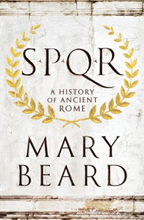 S.P.Q.R. A History of Ancient Rome
S.P.Q.R. A History of Ancient Rome
by Mary Beard
Illustrating how a classical democracy yielded to a self-confident and self-critical empire, S.P.Q.R. reintroduces us, though in a wholly different way, to famous and familiar characters, Hannibal, Julius Caesar, Cleopatra, Augustus, and Nero, among others. Beard expands the historical aperture to include those overlooked in traditional histories: the women, the slaves and ex-slaves, conspirators, and those on the losing side of Rome’s glorious conquests. Like the best detectives, Beard sifts fact from fiction, myth and propaganda from historical record.
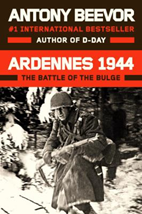
Ardennes 1944: The Battle of the Bulge
by Antony Beevor
Prizewinning historian Antony Beevor takes an in depth look at the Ardennes offensive, one of the greatest battles of World War II. Deeply researched, this riveting new account examines a battle that would prove to be the battle which finally broke the back of the Wehrmacht.
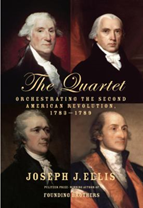
The Quartet: Orchestrating the Second American Revolution, 1783-1789
by Joseph J. Ellis
The unexpected story of why the thirteen colonies, having just fought off the imposition of a distant centralized governing power, would decide to subordinate themselves anew. Ellis has given us a gripping and dramatic portrait of one of the most crucial and misconstrued periods in American history.
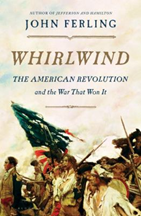
The Whirlwind: The American Revolution and the War That Won It
by John Ferling
Written in Ferling’s engaging and narrative-driven style that made books like Independence and The Ascent of George Washington critical and commercial successes, Whirlwind is a fast-paced and scrupulously told one-volume history of this epochal time. Balancing social and political concerns with a careful examination of the war itself, Ferling has crafted the ideal book for armchair military history buffs, a book about the causes of the American Revolution, the war that won it.
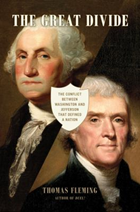 The Great Divide: The Conflict between Washington and Jefferson t hat Defined a Nation
The Great Divide: The Conflict between Washington and Jefferson t hat Defined a Nation
by Thomas Fleming
Acclaimed historian Thomas Fleming examines how the differing temperaments and leadership styles of Washington and Jefferson shaped two opposing views of the presidency–and the nation. The clash between these two gifted men, both of whom cared deeply about the United States of America, profoundly influenced the next two centuries of America’s history and resonates in the present day.
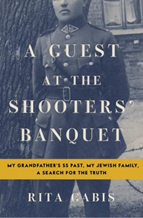
A Guest at the Shooters’ Banquet: My Grandfather’s SS Past, My Jewish Family, a Search for the Truth
by Rita Gabis
Rita Gabis comes from a family of Eastern European Jews and Lithuanian Catholics. She was close to her Catholic grandfather as a child and knew one version of his past: prior to immigration he had fought the Russians, whose brutal occupation of Lithuania destroyed thousands of lives before Hitler’s army swept in. Five years ago, Gabis discovered an unthinkable dimension to her family story: from 1941 to 1943, her grandfather had been the chief of security police under the Gestapo in a Lithuanian town.
 Spain: The Center of the World, 1519-1682
Spain: The Center of the World, 1519-1682
by Robert Goodwin
The Golden Age of the Spanish Empire would establish five centuries of Western supremacy across the globe and usher in an era of transatlantic exploration that eventually gave rise to the modern world. It was a time of discovery and adventure, of great political and social change, it was a time when Spain learned to rule the world. Spain is a sweeping and revealing portrait of Spain at the height of its power and a world at the dawn of the modern age.
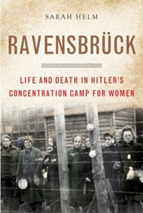
Ravensbrück: Life and Death in Hitler’s Concentration Camp for Women
by Sarah Helm
A masterly and moving account of the most horrific hidden atrocity of World War II: Ravensbrück, the only Nazi concentration camp built for women. While the core of this book is told from inside the camp, the story also sheds new light on the evolution of the wider genocide, the impotence of the world to respond, and Himmler’s final attempt to seek a separate peace with the Allies using the women of Ravensbrück as a bargaining chip. Chilling, inspiring, and deeply unsettling.
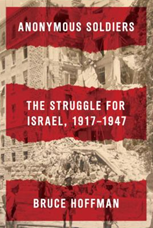 Anonymous Soldiers: The Struggle for Israel, 1917-1947
Anonymous Soldiers: The Struggle for Israel, 1917-1947
by Bruce Hoffman
A landmark history, based on newly available documents, of the battles between Jews, Arabs, and the British that led to the creation of Israel. The story of how Britain, in the twilight of empire, struggled and ultimately failed to reconcile competing Arab and Jewish demands and uprisings. This towering narrative, is essential to anyone wishing to understand not just the origins of modern-day Israel, but also the methodology of terrorism and the current situation in the Middle East.
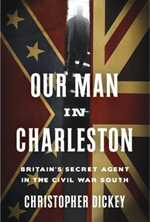
Our Man in Charleston: Britain’s Secret Agent in the Civil War South
by Christopher Dickey
Between the Confederacy and recognition by Great Britain stood one unlikely Englishman. When Robert Bunch arrived in Charleston to take up the post of British consul in 1853, he was young and full of ambition. In an age when diplomats often were spies, Bunch’s job included sending intelligence back to the British government in London. Yet as the United States threatened to erupt into Civil War, Bunch found himself plunged into a double life, settling into an amiable routine with his slavery-loving neighbors on the one hand, while working furiously to thwart their plans to achieve a new Confederacy.
 S.P.Q.R. A History of Ancient Rome
S.P.Q.R. A History of Ancient Romeby Mary Beard
Illustrating how a classical democracy yielded to a self-confident and self-critical empire, S.P.Q.R. reintroduces us, though in a wholly different way, to famous and familiar characters, Hannibal, Julius Caesar, Cleopatra, Augustus, and Nero, among others. Beard expands the historical aperture to include those overlooked in traditional histories: the women, the slaves and ex-slaves, conspirators, and those on the losing side of Rome’s glorious conquests. Like the best detectives, Beard sifts fact from fiction, myth and propaganda from historical record.

Ardennes 1944: The Battle of the Bulge
by Antony Beevor
Prizewinning historian Antony Beevor takes an in depth look at the Ardennes offensive, one of the greatest battles of World War II. Deeply researched, this riveting new account examines a battle that would prove to be the battle which finally broke the back of the Wehrmacht.

The Quartet: Orchestrating the Second American Revolution, 1783-1789
by Joseph J. Ellis
The unexpected story of why the thirteen colonies, having just fought off the imposition of a distant centralized governing power, would decide to subordinate themselves anew. Ellis has given us a gripping and dramatic portrait of one of the most crucial and misconstrued periods in American history.

The Whirlwind: The American Revolution and the War That Won It
by John Ferling
Written in Ferling’s engaging and narrative-driven style that made books like Independence and The Ascent of George Washington critical and commercial successes, Whirlwind is a fast-paced and scrupulously told one-volume history of this epochal time. Balancing social and political concerns with a careful examination of the war itself, Ferling has crafted the ideal book for armchair military history buffs, a book about the causes of the American Revolution, the war that won it.
 The Great Divide: The Conflict between Washington and Jefferson t hat Defined a Nation
The Great Divide: The Conflict between Washington and Jefferson t hat Defined a Nationby Thomas Fleming
Acclaimed historian Thomas Fleming examines how the differing temperaments and leadership styles of Washington and Jefferson shaped two opposing views of the presidency–and the nation. The clash between these two gifted men, both of whom cared deeply about the United States of America, profoundly influenced the next two centuries of America’s history and resonates in the present day.

A Guest at the Shooters’ Banquet: My Grandfather’s SS Past, My Jewish Family, a Search for the Truth
by Rita Gabis
Rita Gabis comes from a family of Eastern European Jews and Lithuanian Catholics. She was close to her Catholic grandfather as a child and knew one version of his past: prior to immigration he had fought the Russians, whose brutal occupation of Lithuania destroyed thousands of lives before Hitler’s army swept in. Five years ago, Gabis discovered an unthinkable dimension to her family story: from 1941 to 1943, her grandfather had been the chief of security police under the Gestapo in a Lithuanian town.
 Spain: The Center of the World, 1519-1682
Spain: The Center of the World, 1519-1682by Robert Goodwin
The Golden Age of the Spanish Empire would establish five centuries of Western supremacy across the globe and usher in an era of transatlantic exploration that eventually gave rise to the modern world. It was a time of discovery and adventure, of great political and social change, it was a time when Spain learned to rule the world. Spain is a sweeping and revealing portrait of Spain at the height of its power and a world at the dawn of the modern age.

Ravensbrück: Life and Death in Hitler’s Concentration Camp for Women
by Sarah Helm
A masterly and moving account of the most horrific hidden atrocity of World War II: Ravensbrück, the only Nazi concentration camp built for women. While the core of this book is told from inside the camp, the story also sheds new light on the evolution of the wider genocide, the impotence of the world to respond, and Himmler’s final attempt to seek a separate peace with the Allies using the women of Ravensbrück as a bargaining chip. Chilling, inspiring, and deeply unsettling.
 Anonymous Soldiers: The Struggle for Israel, 1917-1947
Anonymous Soldiers: The Struggle for Israel, 1917-1947by Bruce Hoffman
A landmark history, based on newly available documents, of the battles between Jews, Arabs, and the British that led to the creation of Israel. The story of how Britain, in the twilight of empire, struggled and ultimately failed to reconcile competing Arab and Jewish demands and uprisings. This towering narrative, is essential to anyone wishing to understand not just the origins of modern-day Israel, but also the methodology of terrorism and the current situation in the Middle East.

Our Man in Charleston: Britain’s Secret Agent in the Civil War South
by Christopher Dickey
Between the Confederacy and recognition by Great Britain stood one unlikely Englishman. When Robert Bunch arrived in Charleston to take up the post of British consul in 1853, he was young and full of ambition. In an age when diplomats often were spies, Bunch’s job included sending intelligence back to the British government in London. Yet as the United States threatened to erupt into Civil War, Bunch found himself plunged into a double life, settling into an amiable routine with his slavery-loving neighbors on the one hand, while working furiously to thwart their plans to achieve a new Confederacy.





No comments:
Post a Comment